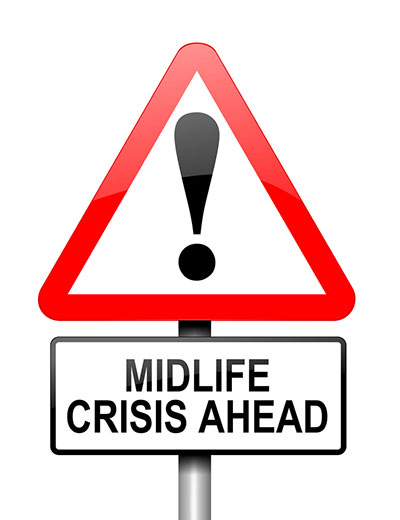First things first… Have you been checking out the profile of your old girlfriends or boyfriends on social media? Reminiscing excessively about your childhood days? Or, perhaps, considering a hair transplant to cover that thinning pate?
If you answered ‘YES’, you might be headed on the road to a midlife crisis. For, reports from experts on the subject have listed those and others as common symptoms of a midlife crisis in men, one that could hit anytime in the early 40s, and last anywhere between three to ten years.
The clichéd ‘men get naughty at the age of 40’ is probably a cue to the changes that the 40s signal in a man’s life. Often, this stage is seen by most as an opportunity to poke fun at men; as if midlife is a buffoon in disguise. But the very fact that it is given a ‘crisis’ tag does signify the impact, rather the avalanche of issues and concerns that the stage throws on the unsuspecting man, who is all very fine one day, and the next has this inexplicable feeling of time running out. Of course, it is not an illness, nor an inevitable developmental phase, but men who are in this midlife crisis stage are known to experience anxiety and depression – at times needing medication.
Some of the common signs of depression in this stage are a low or dull mood that stretches for two weeks (or even more), feelings of hopelessness and weariness, lack of joy in life, inability to concentrate on everyday tasks and sleeping more than usual. Some men also go through a loss of libido and experience erectile dysfunction, in addition to physical and emotional. On a milder level, the symptoms could range from a feeling of listlessness to reminiscing about youth.
Bored and worried: One of the first signs is the feeling of ennui, emanating from the constant thought that time is running out and that dreams have remained unfulfilled. This could lead you to quit the job in a bid to give the everyday routine a shakeup or find other ways to distract, like partying with friends or hanging out with the boys. Conversely, you might even be worried that a younger assistant will steal your job.
Feel unattractive: Loss of youth will bring about physical changes that might make you question your attractiveness quotient for your partner. Whether it is the paunch that is protruding or the head that is greying and/or balding, the midlife crisis will bring about all the drama that can make you worry about your appearance; add to that a general drop in stamina and other related aspects…
Hobbies become uninteresting: With time, some habits and hobbies, inevitably, take a back seat and even lose their initial sheen. But owing to the midlife crisis you might opt for unhealthy habits or even indulge in overeating, over-drinking and the like.
Feel uneasy: You might feel uneasy about several major elements in your life, ranging from career and marriage to your health and home.

Crisis Control
The midlife crisis could turn into a family crisis if it is not given due attention to rectify the little and big concerns associated with it. With just a few simple steps, you could bring the status quo back into your life.
Turn back the clock on the crisis by incorporating these positive facets into your life.
Make your relationship work: Marriage, like every other relationship in your life, requires time, effort and energy. If midlife has placed a spoke in your marriage wheel, you need to give more to your relationship and get it back on track.
Stop worrying: Constant and obsessive worrying about your work will add more to your disappointment. Shift your attention to all the positive factors of your work, focus on your strengths and be thankful that you have your job, especially in the present situation where people are routinely losing their jobs.
Stay fit: All the physical changes that midlife has brought about needs you to stick to a fitness regime that will bolster your esteem and give you a reason to eat healthily. Workouts, generally, are known to make you feel better about yourself.
Look ahead: Yes, look towards the future instead of constantly looking back at your younger days. Go on, make plans for the future and keep your thoughts focused on the outcome of those plans.
Communicate: There is nothing more comforting than sharing your thoughts and feelings with others of your age group. This will help you identify your crisis and find consolation in like-minded talks.
However, if nothing works, or if you feel the symptoms are growing and affecting your everyday life and relationships, seek counselling therapy.

